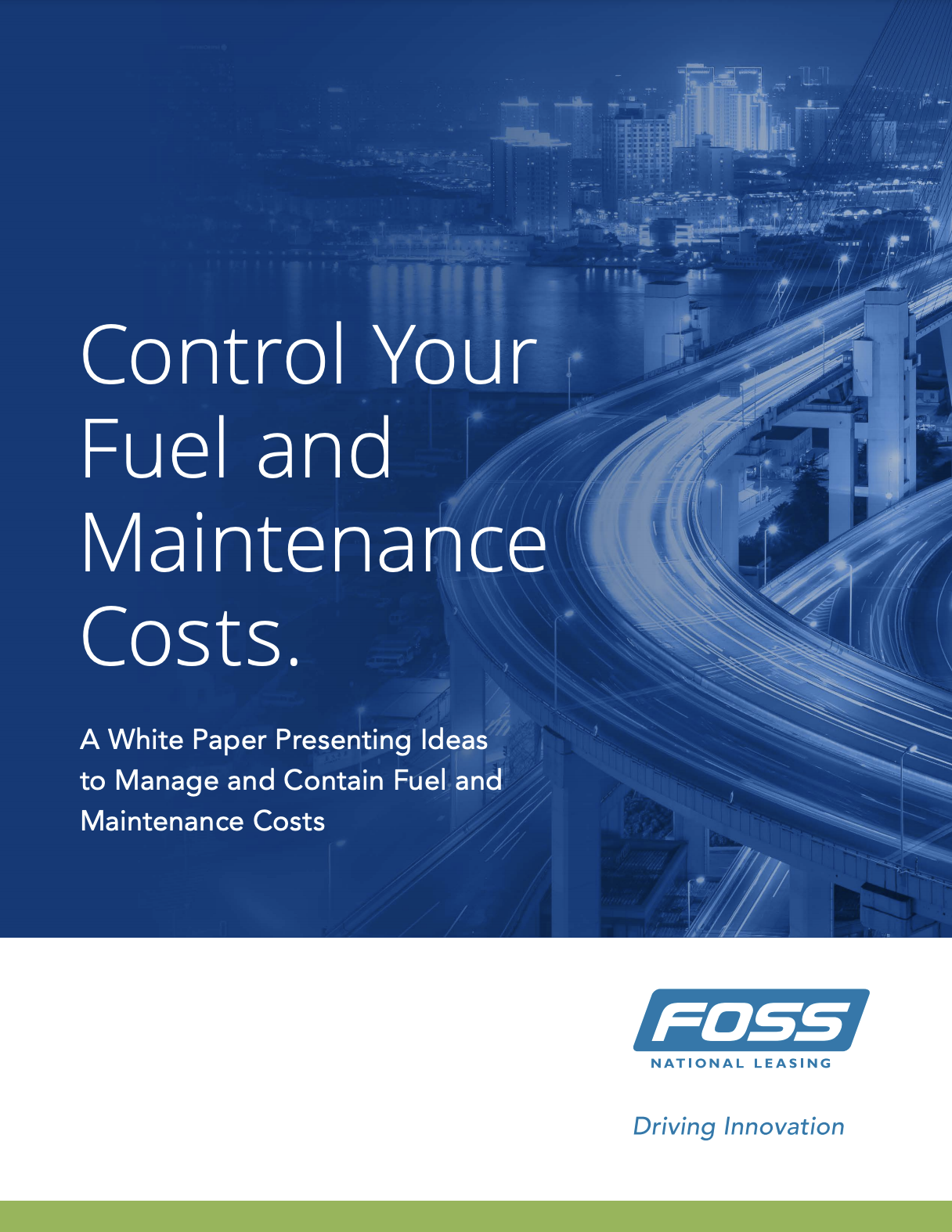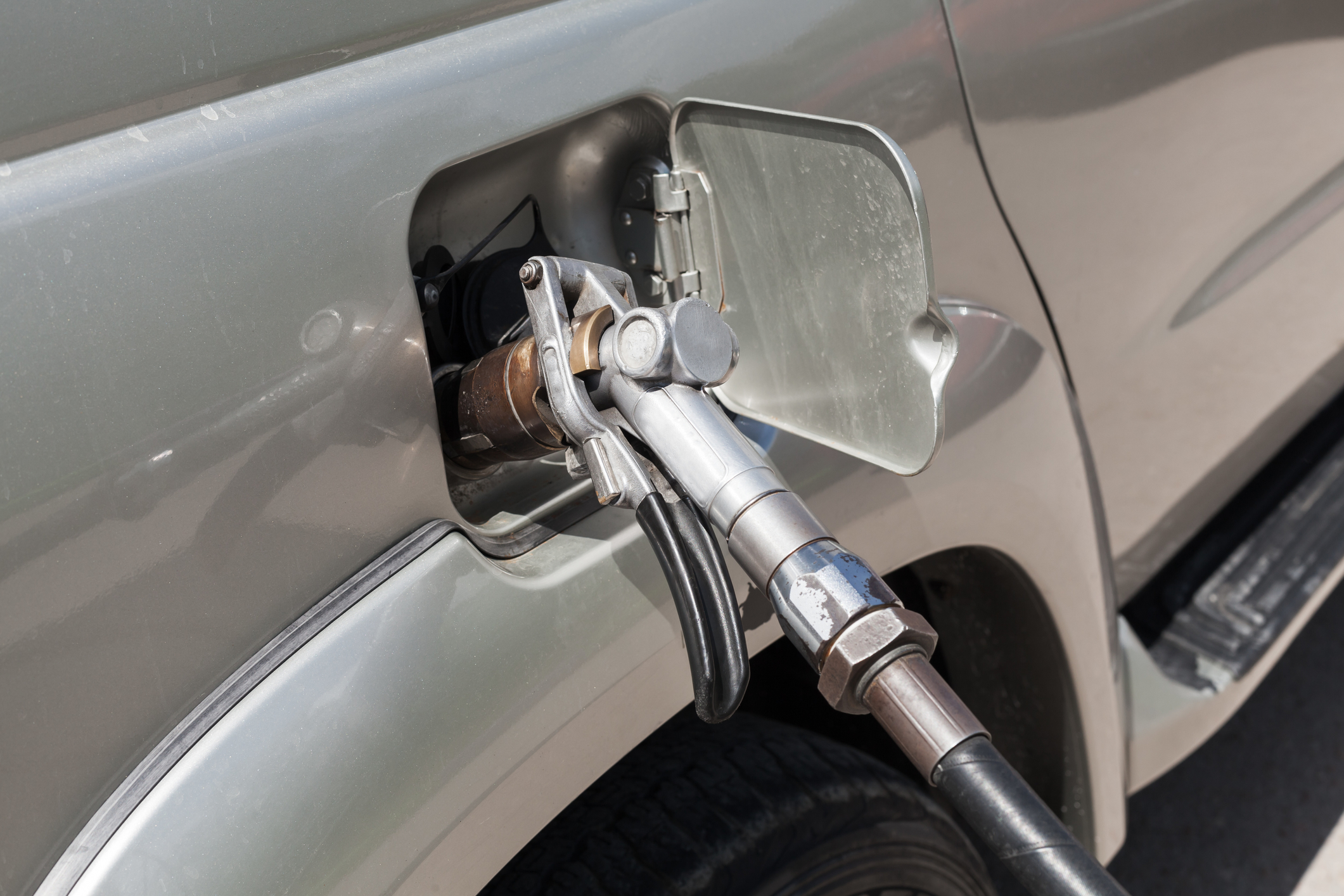
Today, fleet managers are under pressure to increase vehicle availability while reducing costs.
But the fact is, costs are going up—in large part due to today’s fuel prices. Companies rely on vehicles to service customers, but increased driving can also wallop the bottom line.
Fuel usage is thorny for another reason. Today's green movement has led to corporate sustainability mandates calling for reduced carbon footprints.
So the question is: How can you run your growing business using less fuel?
Consider an often missed option that reduces fuel consumption and improves sustainability: Convert your vehicles to run on auto propane.
In this blog, we’ll discuss the noteworthy fuel cost savings and environmental benefits of this overlooked alternative fuel.
FOSSIL FUEL TAXES ARE SKYROCKETING IN CANADA
Fuel at the pump prices are higher than ever. But they're nothing compared to what's coming.
Fleet managers can expect to see a tax increase of at least 20–25 cents* per litre for gasoline and diesel, within the next three years. This is on top of market conditions that are driving up fuel costs.
The Pan-Canadian Framework on Clean Growth and Climate Change will bring an added cost layer as shown in the chart below:
Carbon Tax Increases - 2018 to 2022

As you can see, even with the Carbon Tax increases, the cost of propane is, and will remain significantly less than gasoline or diesel. In fact, propane has cost about half the price of gas for the last 60 years.
The graphs below show the cost of unleaded gas (blue), diesel (black), and propane (green) over the past decade in Ontario, Quebec, and Vancouver. The tables show current prices of all three.
Ontario
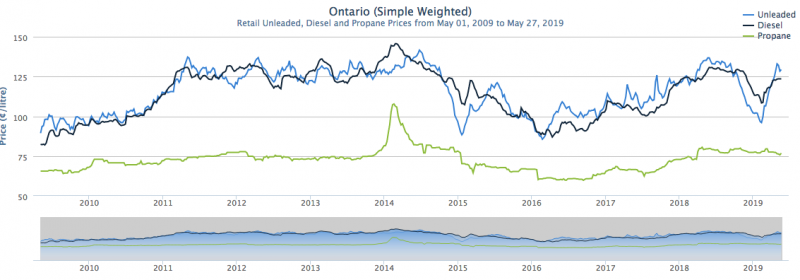
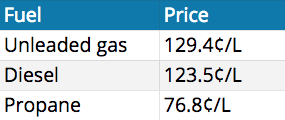
Week of May 21, 2019
Quebec
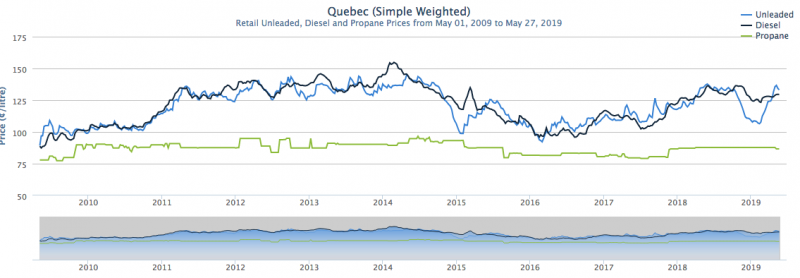
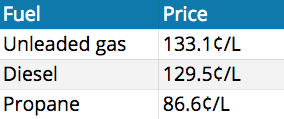
Week of May 21, 2019
Vancouver
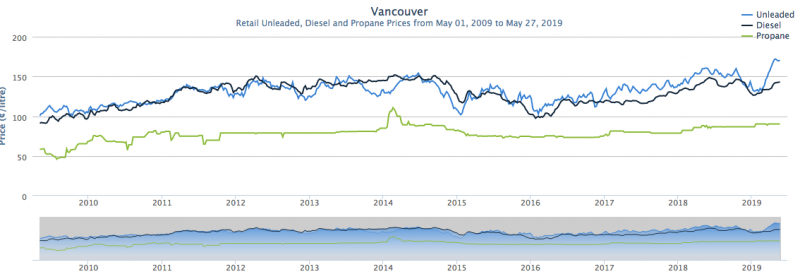
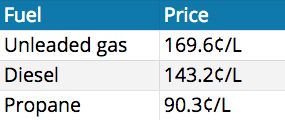
Propane: A lower cost fuel to improve your bottom line
The numbers speak for themselves. Propane offers clear fuel cost savings over both gas and diesel. And the more vehicles you convert to propane, the higher your savings will be.
Note that although propane's lower energy density results in lower fuel economy, its economical price per litre can quickly generate 20–40% savings in cents-per-km driven. Further, beyond usage savings, propane offers cost benefits in other ways.
It has a high octane rating of 104–112, compared to the 87–92 rating of gasoline. This contributes to improved engine life in propane-powered vehicles. These vehicles also have less carbon build-up. As a result, many fleets report reduced maintenance costs and increased lifespan for vehicles that run on propane.
A greener fuel to reflect your company’s sustainability initiatives
Propane is a byproduct of natural gas or oil production, making it inherently resource-efficient. Compared to gas, propane emits 20–25% less greenhouse gas emissions and 81% less particulate number (PN) emissions. Compared to diesel, propane emits 74% less nitrogen oxides (NOx) and 81% less particulate matter (PM) emissions*.
To put it into perspective, 96 propane buses emit the same NOx and PM emissions as one equivalent diesel bus*. Additionally, because of its extremely low sulphur content, propane doesn’t produce significant amounts of the sulphur oxides that precipitate acid rain and smog.
Even fleets with hybrid electric vehicles can take advantage of propane by converting the gasoline components. Why not employ all strategies to lower fuel consumption and harmful emissions?
Finally, bio propane—produced from wastes, vegetable oils, or other renewable sources—is being developed in Europe. It will be available in Canada in coming years and will further reduce well-to-wheels CO2 emissions by up to 80%.
How does propane work?
You might associate propane with barbecue grills and camping stoves, not with your vehicles.
But an auto propane system simply replaces the existing gasoline system in a vehicle’s engine.
Once installed, it pulls liquid from the tank and then burns the fuel as it did with gas. And it actually operates better than petrol in freezing temperatures.
Propane has an extremely low freezing point of –188 degrees Celsius and it "boils" into usable liquid form from –42 degrees Celsius.
How much does auto propane conversion cost?
The average cost to convert a standard vehicle to run on propane is $6,000 per vehicle. This includes parts—propane tank and conversion kit —and labour.
While conversion does require an upfront investment, fleet managers should see returns on their costs in just two years. Note: fleet managers will see the most benefits when using propane in light- and medium-duty vehicles.
Rest assured that conversion doesn't require special approval or other red tape. Propane conversion kits and installations are approved by CSA for safety. Tanks are designed, installed, and approved by Transport Canada. Finally, propane conversions do not void vehicle warranties.
Where can you fuel up?
Finding a gas station is a no-brainer. But what about refilling a propane tank?
There are already about 900 propane retailers across Canada, with highest concentrations in Alberta, Ontario, and Quebec. Many are operated by major gasoline companies—so just look for your favorite gas station.
Summing Up
Auto propane is an affordable, accessible, and more sustainable alternative fuel. Converting your vehicles to run on propane will drastically reduce your long term costs. It’s also a major step towards reducing the carbon footprint of your fleet.
Meet your budget and sustainability goals with auto propane. Your executive team, and your community, will thank you.
*Data from Alternative Fuel and Sustainable Fleets: Revolutionize Your Fleet With Autogas webinar
Get to Know the Author
Dave is a highly motivated, innovative and results-oriented sales executive. He is passionate about coaching and sustaining high-performance teams that enhance the customer experience and achieve business objectives.
He knows the fleet business from the ground up with over two decades of fleet management experience. He has held several senior management roles overseeing new business development, customer satisfaction, account management and operations.
Dave maintains a keen aptitude for continually assessing and adapting to the needs of clients.
Meet our team




